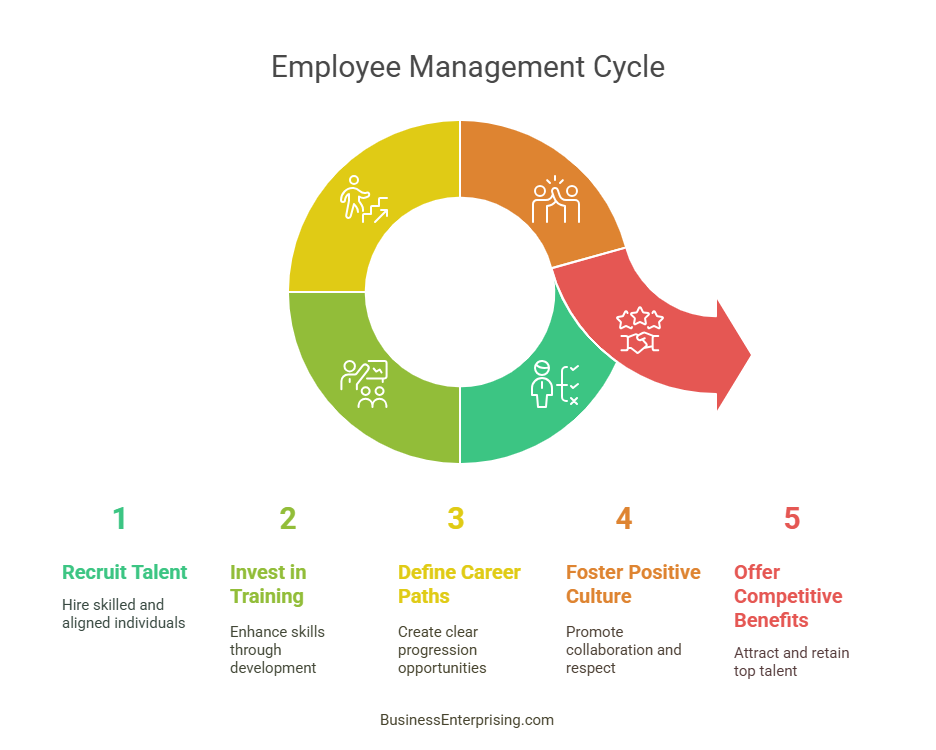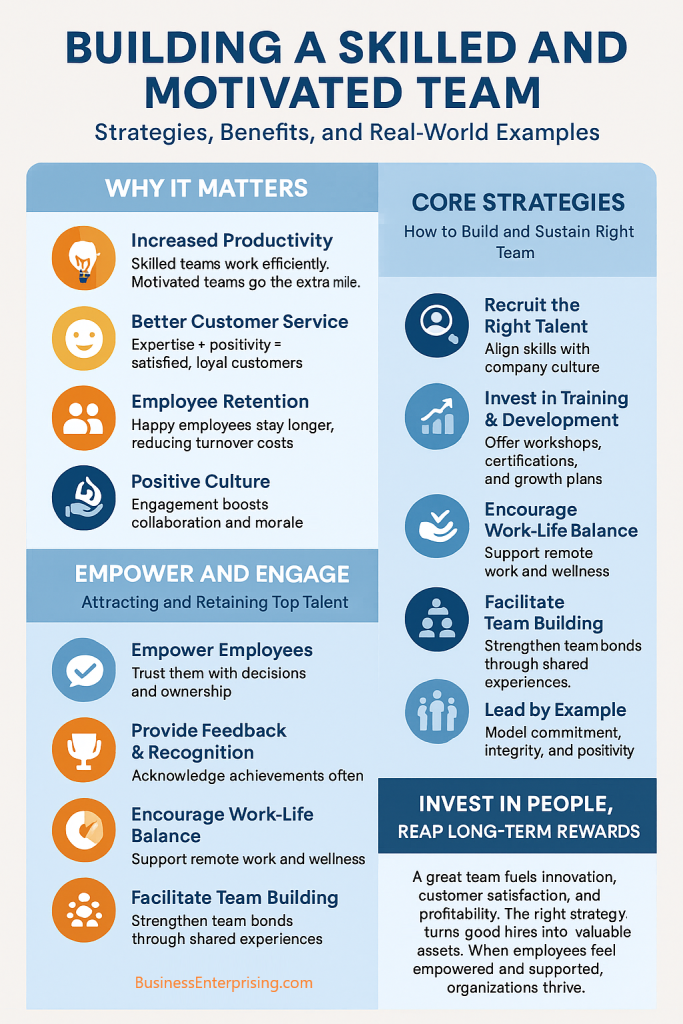Building a skilled and motivated team is crucial for achieving organizational success. A talented and enthusiastic workforce drives productivity, fosters innovation, and enhances overall business performance. For employers, creating and maintaining such a team requires strategic planning, continuous investment in development, and a strong organizational culture.
The Importance of Building a Skilled and Motivated Team
Increased Productivity: The first thing to remember is that skilled employees perform tasks efficiently and effectively, leading to higher productivity levels. Accordingly, motivated employees are more engaged and committed, often going above and beyond to achieve organizational goals.
Enhanced Innovation: A team with diverse skills as well as high motivation is more likely to generate innovative ideas and solutions. Creativity and problem-solving abilities also thrive in an environment where employees feel valued and inspired.
Better Customer Service: Skilled and motivated employees deliver superior customer service. Their expertise and positive attitude translate into better customer interactions, fostering loyalty and satisfaction.
Employee Retention: A motivated workforce is less likely to seek employment elsewhere. Retaining skilled employees reduces turnover costs and ensures continuity and stability within the organization.
Positive Work Environment: Motivated employees contribute to a positive and collaborative work culture. A supportive environment where employees feel appreciated and empowered promotes teamwork and morale.
Strategies for Building a Skilled and Motivated Team
Recruit the Right Talent: Building a skilled and motivated team involves hiring individuals who possess the necessary skills and align with your company’s values and culture. Use a comprehensive recruitment process that includes skills assessments, behavioral interviews, and cultural fit evaluations to identify the best candidates.
Invest in Training and Development: Provide ongoing training and development opportunities to enhance employees’ skills and knowledge. Offer workshops, seminars, online courses, and certifications relevant to their roles. Encourage continuous learning and career growth.
Create Clear Career Paths: Define clear career progression paths within the organization. Employees are more motivated when they see opportunities for advancement and understand the steps needed to achieve their career goals. Regularly discuss career development plans with employees.
Foster a Positive Work Culture: Cultivate a work environment that values collaboration, respect, and inclusivity. Promote open communication, recognize achievements, and celebrate successes. A positive culture boosts morale and motivates employees to contribute their best.
Offer Competitive Compensation and Benefits: Ensure that your compensation packages are competitive within the industry. Offer benefits such as health insurance, retirement plans, paid time off, and flexible work arrangements. Competitive compensation and benefits attract and retain top talent.
Attracting Top Talent
Empower Employees: Empower your team by giving them autonomy and responsibility. Trust employees to make decisions and take ownership of their work. Empowered employees feel more invested in their roles and are motivated to excel.
Provide Regular Feedback and Recognition: Offer constructive feedback and recognize employees’ efforts and achievements regularly. Positive reinforcement and acknowledgment of hard work boost motivation and job satisfaction. Implement recognition programs to reward outstanding performance.
Encourage Work-Life Balance: Promote a healthy work-life balance by offering flexible work schedules, remote work options, and wellness programs. Employees who can balance their professional and personal lives are happier, healthier, and more productive.
Facilitate Team Building Activities: Organize team-building activities and events to strengthen relationships among team members. Activities such as retreats, workshops, and social gatherings foster camaraderie, trust, and collaboration.
Lead by Example: Demonstrate the behaviors and values you expect from your team. Effective leadership sets the tone for the organization. Show commitment, integrity, and a positive attitude to inspire and motivate your employees.
Case Studies: Successful Implementation
Google: Google is renowned for its innovative and employee-centric culture. The company invests heavily in employee development through continuous learning programs and offers numerous perks, including flexible work arrangements and wellness initiatives. Google’s commitment to a positive work environment and employee growth has resulted in a highly skilled and motivated workforce.
Zappos: Zappos focuses on creating a unique company culture that prioritizes employee happiness and customer satisfaction. The company offers extensive training programs, clear career paths, and a supportive work environment. Zappos’ approach to employee empowerment and recognition has fostered a loyal and motivated team.
Salesforce: Salesforce emphasizes employee development and well-being through comprehensive training programs, mentorship opportunities, and a strong focus on work-life balance. The company’s inclusive and supportive culture has led to high employee engagement and retention.
In summary, building a skilled and motivated team is essential for business success. By recruiting the right talent, investing in training and development, fostering a positive work culture, and offering competitive compensation, employers can create an environment where employees thrive. Empowering employees, providing regular feedback and recognition, and encouraging work-life balance further enhances motivation and job satisfaction.
A good team is a significant asset that drives innovation, productivity, and customer satisfaction. By implementing these strategies, employers can cultivate a workforce that is committed, engaged, and poised to achieve organizational goals. Investing in your employees’ growth and well-being not only benefits the individuals but also contributes to the long-term success and sustainability of the business.


